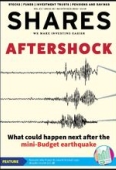Archived article
Please note that tax, investment, pension and ISA rules can change and the information and any views contained in this article may now be inaccurate.
How will the latest tax changes affect me?
The latest mini-Budget announced tax changes for the nation, but
how much better off will you be from them?
The first Budget from the new chancellor Kwasi Kwarteng has caused controversy and seismic market movements, but away from that reaction much of the public are left wondering how much better off they will be next year as a result of the tax changes.
WHAT HAS CHANGED ABOUT NATIONAL INSURANCE?
First up, the National Insurance system was altered again. Former prime minister Boris Johnson and former chancellor Rishi Sunak had already unveiled changes to the system for the current tax year, but Kwarteng undid some of those.
The move means that from November this year National Insurance rates will fall to their previous level, before the Sunak/Johnson 1.25 percentage point surcharge was added. It means that we will all now pay rates of 12% and 2%, rather than the current 13.25% and 3.25%, bringing us back to the same tax rate as last year.
The other move the former chancellor made was raising the threshold at which you pay National Insurance. Usually, this limit increases with inflation each tax year and it was £9,880 for the first few months of this tax year. After that it was raised to £12,570, bringing it in line with the income tax threshold.
It means anyone earning less than this amount won’t pay any National Insurance. After that you pay the 12% rate up to £50,270 and then 2% on any earnings above that level.
The new chancellor chose to maintain that new, higher threshold at the same time as cutting rates, giving a boost to most taxpayers. As you can see from the first table, that saves someone on £25,000 a year around £245 a year in tax, while someone on £100,000 a year will save £1,182 a year – but a similar saving as a proportion of their total income.
WHAT ABOUT INCOME TAX CHANGES?
The new chancellor also unveiled two big changes to the income tax system: reducing the basic rate of tax down from 20% to 19% and scrapping the higher rate of tax altogether, which was 45%. However, in the subsequent days the Government did a U-turn on the additional rate of tax, and it will no longer be scrapped.
The cutting of basic-rate tax saves money for anyone who earns over the current £12,570 threshold. Clearly the more they earn, the more they benefit from that tax reduction.
The maximum benefit is £377, meaning that anyone who earns more than the higher rate income tax threshold will save that amount. Someone on £25,000 will save around £124, while someone on £55,000 will save the maximum £377.
WHAT’S THE TOTAL IMPACT?
The combined impact of the National Insurance and basic-rate tax savings mean that most people earning around £20,000 all the way up to £150,000 will save around 1.5% of their income in tax.
However, this percentage then gets smaller for higher earners as their total tax savings is the same as someone on a far lower salary, meaning the saving is diluted.
Important information:
These articles are provided by Shares magazine which is published by AJ Bell Media, a part of AJ Bell. Shares is not written by AJ Bell.
Shares is provided for your general information and use and is not a personal recommendation to invest. It is not intended to be relied upon by you in making or not making any investment decisions. The investments referred to in these articles will not be suitable for all investors. If in doubt please seek appropriate independent financial advice.
Investors acting on the information in these articles do so at their own risk and AJ Bell Media and its staff do not accept liability for losses suffered by investors as a result of their investment decisions.
Issue contents
Feature
Great Ideas
- Ruffer delivers positive return in difficult times but sees more pain for investors
- Ideal time to invest in life sciences cheaply through this trust
- Essentra's transformation to a pure-play industrial supplier is now complete
- How Crestchic is powering up for a growth push and why now is a great time to buy
Investment Trusts
News
- Will Porsche shares surge like Ferrari or skid like Aston Martin?
- Resilient Greggs holds firm on outlook in good start for Roisin Currie
- FTSE 100 firms set for record cash return in 2022 but pressures are mounting
- Find out which stocks surged and slumped during a turbulent third quarter
- Why dollar strength and foreign exchange volatility is bad for stock markets

 magazine
magazine








